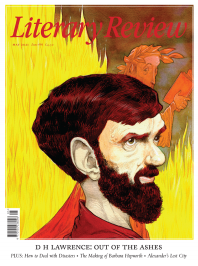Alan Rush
Businesswomen & Belly Dancers
Midnight in Cairo: The Female Stars of Egypt’s Roaring ’20s
By Raphael Cormack
Saqi Books 342pp £20
Today, the area of Cairo around Ezbekiyya and Emad al-Din Street is drab and cheerless. Yet here in the 1920s and 1930s, audiences from across Egypt and the Middle East ventured through lanes peppered with brothels and hashish dens to the Ramses Theatre, the Kursaal music hall, the Casino de Paris and other glittering nightspots. Based on his doctoral thesis on modern Egyptian theatre, Raphael Cormack’s Midnight in Cairo brilliantly re-creates that vanished world and documents the florescence of the entertainment industry sparked by the Ottoman defeat in the First World War and the thrill of entering a new era of revolutionary change.
The careers of the female stars – Fatima Rushdi, Shafiqa al-Qibtiyya, Rose al-Youssef, Badia Masabni, Tahiyya Carioca, Mounira al-Mahdiyya and Oum Kalthoum – are the book’s principal theme. Although long dead and largely unknown to Westerners, superstars like these still have devotees across the Middle East and beyond. Cormack is one of them, but he is less concerned with their performances than with revealing how, as tough proto-feminists, they contributed to the weakening of social and sexual barriers and to the achievement of female independence in Egypt.
Mounira al-Mahdiyya was the most flamboyant. Born in 1885, she starred in musical revues and created her own theatre company, becoming the only serious rival to the greatest female singer of the period, Oum Kalthoum. An observer at one of her rehearsals was amazed by ‘the amount of raw spirits,

Sign Up to our newsletter
Receive free articles, highlights from the archive, news, details of prizes, and much more.@Lit_Review
Follow Literary Review on Twitter
Twitter Feed
Alfred, Lord Tennyson is practically a byword for old-fashioned Victorian grandeur, rarely pictured without a cravat and a serious beard.
Seamus Perry tries to picture him as a younger man.
Seamus Perry - Before the Beard
Seamus Perry: Before the Beard - The Boundless Deep: Young Tennyson, Science, and the Crisis of Belief by Richard Holmes
literaryreview.co.uk
Novelist Muriel Spark had a tongue that could produce both sugar and poison. It’s no surprise, then, that her letters make for a brilliant read.
@claire_harman considers some of the most entertaining.
Claire Harman - Fighting Words
Claire Harman: Fighting Words - The Letters of Muriel Spark, Volume 1: 1944-1963 by Dan Gunn
literaryreview.co.uk
Of all the articles I’ve published in recent years, this is *by far* my favourite.
✍️ On childhood, memory, and the sea - for @Lit_Review :
https://literaryreview.co.uk/flotsam-and-jetsam